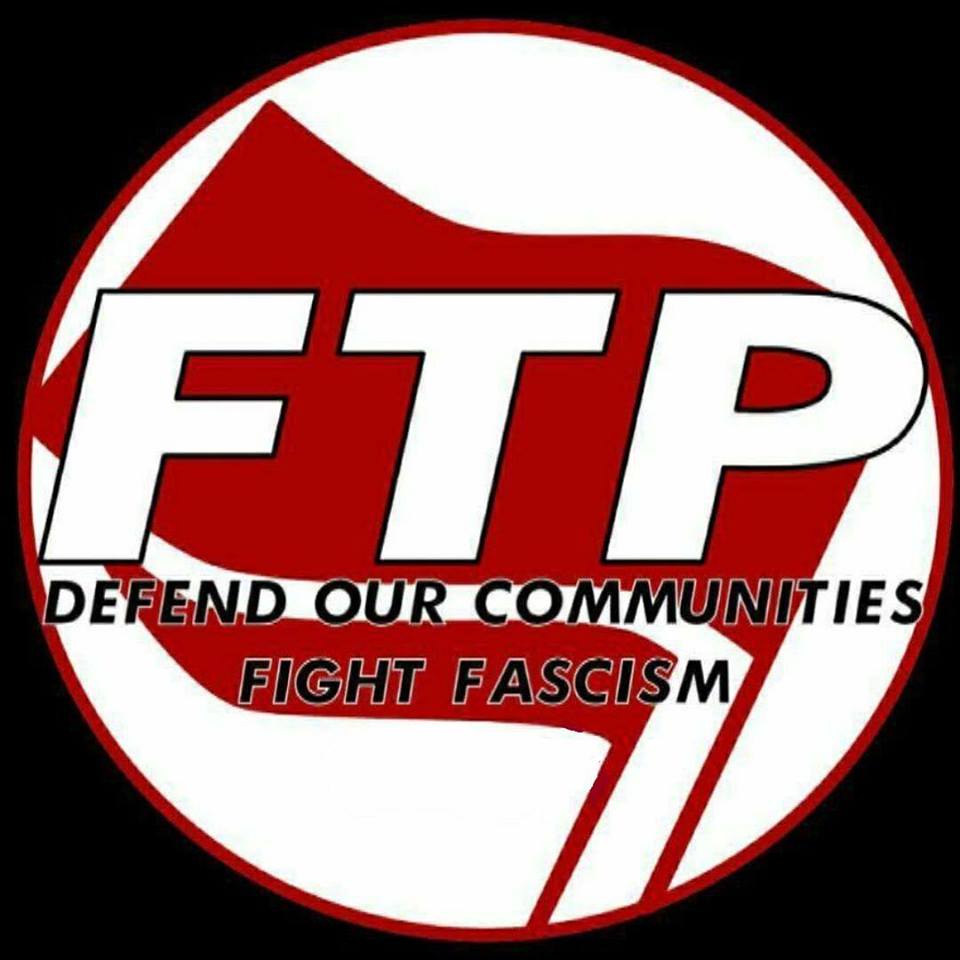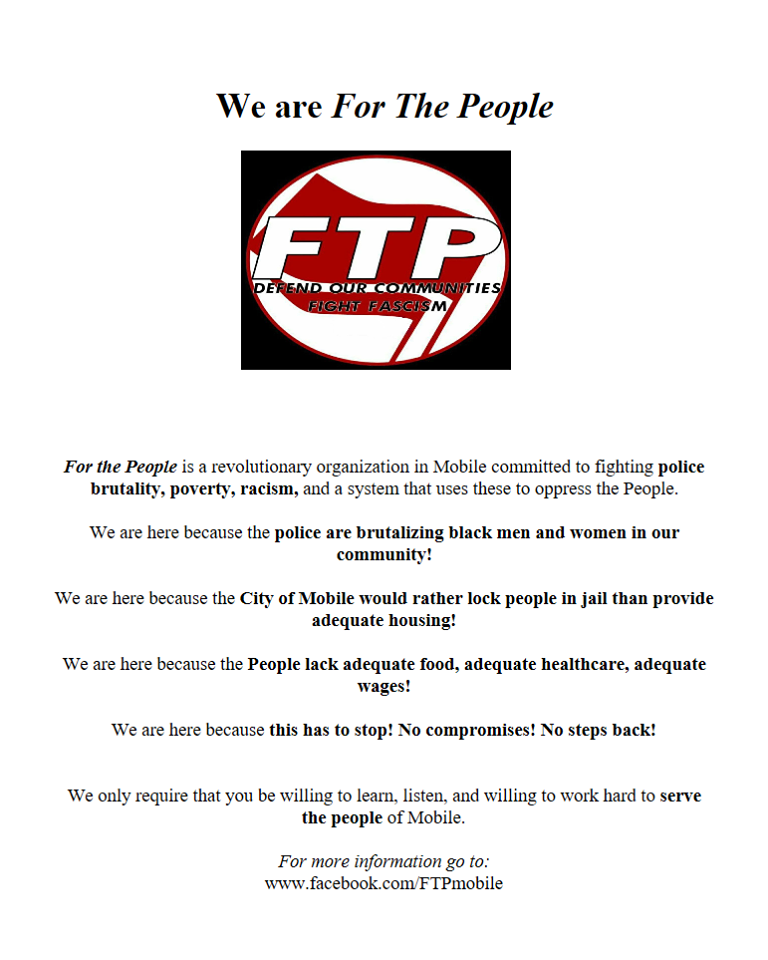Organizing in the South: An Interview with FTP-Mobile
"...There's no mass work or base-building work going on here, that's why we made FTP-Mobile. We wanted to separate ourselves from that and actually do community work."

A Red Voice News interview with Chris of FTP–Mobile (For the People – Mobile)
RV: Hi Chris, what are some problems affecting Mobile?
Chris: There's a lot of problems affecting Mobile. Mobile really has no sort of Leftist history.
Mobile is a city, and like most cities in the South, it's majority black, it's very poor – most places in Alabama are – I think the poverty rate is double or triple the national average. There's police brutality, a lot of cases – one made national news earlier this year in Saraland, the Chikesia Clemens case. There's not a lot of jobs, it's mostly service industry. The good jobs are usually working for Boeing or the shipbuilders. The city's very gerrymandered, in terms of how the districts are drawn up.
There really has been no left history here, as compared to most places in Alabama, where there's a very deep left history. The Alabama Communist Party was the largest communist organization in the United States in the 1920s/1930s. But that did not reach down here. The civil rights movement didn't reach down here; Martin Luther King Jr. was turned away at the airport and forced to leave the city when he came down. Stokely Carmichael, as well, was driven and escorted out the city when he came down. The community leaders were the church leaders, so "we don't have those problems down here, we don't want anybody making waves."
There's this apathy within the masses, they aren't very primed to organize or mobilize if something happens. There's usually not a lot of turnout for anything. Even the Chikesia Clemens thing – which made national news – the first day probably had 30 or 40 people protesting, and then after that it completely died away, and the same thing happens when any sort of issue faces the city. It's very hard to get people mobilized and into action.
RV: Why do you think that is?
Chris: I just think there's a history here of apathy. There's a legacy of not wanting to make waves, not having any sort of left movement here, not even having the civil rights movement come down here. There's absolutely no basis for any sort of community action.
I don't know if that's the reason people are apathetic here, there's a lot of factors, like poverty, but historically, leftist organizing in Mobile has been a very difficult task.
RV: Do you think that affects just leftist organizing, or any kind of organizing?
Chris: I think leftist organizing is obviously harder. Lots of organizing is difficult. A lot of things here go through the churches, so when the churches organize something, they get people out, but that's generally more, like, liberal stuff. Even then, in terms of community action, it's just hard.
RV: You already talked about a little bit of the social makeup of Mobile, but if you want to expand more on that: who lives in Mobile?
Chris: The city has a population of 193,000 that's been declining for the past 20 years. 52% black, 40% white, and the poverty rate is 22%. You have the white rich areas and the very poor black areas, but there's a lot of smaller areas around, kind of satellite cities, like Prichard, which is a majority-black city just north of downtown Mobile, and then north of that, Saraland and Chickasaw, which are generally majority-white.
You have a lot of white flight from Prichard in the 60s and from the downtown area of Mobile due to immigration. So it's a very segregated city, but it is majority-black and majority-poor.
RV: Mostly the common effects of de-industrialization, would you say?
Chris: Yeah, like Prichard is a good example of that. You had the paper plant there, you had a lot of white workers – Prichard used to be majority-white – then you had a lot of influx of the black population. Of course the white workers went off and they closed down a lot of the industry along the river. Prichard used to be very affluent, and then they closed down all the industry, and now it's one of the poorest cities in Alabama.
RV: So in the face of all these problems, what exactly does FTP-Mobile do in Mobile?
Chris: Well, there's a few things we're trying to do. We're really trying to get re-organized here. We had a hard time with just generally organizing, ourselves. We had a general group of people organized, about 6 or 7 of us, and a lot of people moved away or went on to do other things. And the actual FTP-Mobile, our circle has kind of dwindled. We've lost some really good resources in the city.
Just getting off our feet here is always such a difficult task, we've been trying one thing, another thing, for a few years, and it feels like we haven't gone anywhere. Especially with just how hard it is to get people out to do anything. Every event, everything has always been just people we know, no matter how well-advertised or gone out for. Getting people to show up – and they just don't show up.
RV: What kind of events are these?
Chris: There's been a few events over the years, there's been rallies and protests, and a lot of protest stuff, especially in the Chikesia Clemens case, you have some kind of liberal co-opting. We've been wanting to get a community political education thing going once a week called "Freedom Fridays", where we're gonna have an hour of political education and an hour of basketball for the kids; we have a place for that, but it's just a matter of getting it off the ground. The other people that were gonna be involved in that moved to Birmingham, so now it's just me and one other person.
It's very hard to do anything with two people. We have a lot of ideas; I got out and handed food to the homeless and tried to figure out how to best start a food program by just doing it and seeing what works and what doesn't, but we've never gotten anything off the ground here, at all.
RV: Everything still just seems experimental?
Chris: Yeah, it's really just a lot of experimental stuff, just trying to figure out what works. Leftist organizing is 6 or 7 years old in Mobile, and nothing's worked.
RV: Would you say this experience right now is generally applicable to organizing in the South overall?
Chris: Not at all! Like, look at Cooperation Jackson. That's about two and a half hours away from us and they're the gold standard of leftist organizing! They have so much stuff going on, everything they do, all the programs, their community center, what they've been able to accomplish in a very short time – and Jackson isn't that culturally different than Mobile. Very similar demographics, very similar poverty issues, very similar culturally. I don't know how we break through that wall here. And New Orleans, just two hours away from us, they have a very strong leftist scene.
RV: New Orleans is also a pretty dense, big place, right?
Chris: Yeah, New Orleans is pretty big. I think they have about million and a half in the metro, whereas in Mobile, we have a metro of about half a million people over a few counties. It's very spread out here, the city is stupidly designed.
RV: Is Jackson more spread out or is it also more dense?
Chris: I don't know. I've been to Jackson a few times, feels like a regular, mid-sized city.
RV: What's been your experience with organizing in Mobile?
Chris: I've been here in an organizing capacity for about a year and a half. I'm from here, but I spent about ten years away.
Originally we're a group named Mobile Bay Socialist Collective, which grew out of a split of Mobile Socialist Alternative, which is now defunct, and that organization (Mobile Bay Socialist Collective) became defunct about a year ago due to problems between the membership and the leadership, where the leadership (which was me and two others) resigned and went on to form FTP-Mobile last summer.
My general experience of organizing has been nothing but failure and burnout. That's really it. I can't think of anything that was a real success. There's been protest actions and rallies, and there's more than a few leftists here, but most of them are on their own sides and they never really go beyond the rally and the protest-cycle. There's no mass work or base-building work going on here, that's why we made FTP-Mobile. We wanted to separate ourselves from that and actually do community work. But getting people on board with that – cause everybody wants to go to the fucking protest, nobody wants to work in the garden. You know?
That's how it is. People just want to show up, take their pictures, they got their sign, looking like they're fighting for the revolution out here – you got twelve people at a rally, calm the fuck down. There's so much work to be done, community work, mass work, all that stuff, and it really feels like people are only interested in protests and rallies.
RV: Thank you very much for answering so in-depth.
Chris: Thank you very much, I hope that was clear.

